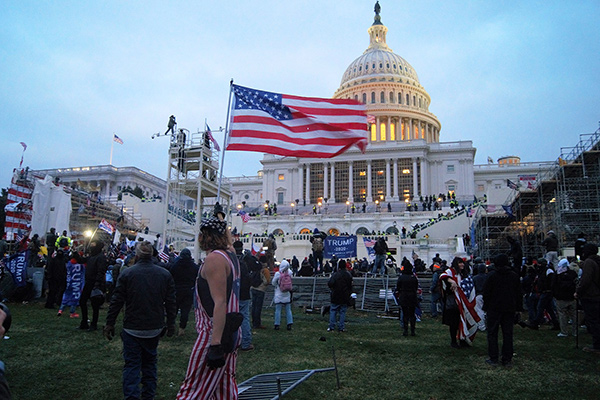Taking back democracy?
Shauna Wilton - 23 February 2021

Professor Shauna Wilton notes that one of the reasons the images of the riots on Capitol Hill and the storming of Congress in early January are so upsetting is because they represent a breaking of the social contract, which is essential to democracy. (Image: Tyler Merbler)
The riots on Capitol Hill and the storming of Congress at the beginning of January were shocking to many for a wide range of reasons. One reason why the images of the riots were so upsetting was that they represented the breaking of the social contract which is essential to democracy.
Democracy is based on a social contract: the idea that the rulers of a society and those they rule are bound by an agreement to follow certain rules. As individuals, we consent to giving up certain freedoms or liberties in exchange for the protection of the state. We agree to follow laws because the enactment and enforcement of those laws provides us with security and stability as a society. This contract isn’t something we sign or necessarily explicitly agree to; rather, it provides a framework for how people can live together and supports the legitimacy of those who govern us.
The role of the American President, as Head of State, is to protect the institutions of governance, the constitution and the rule of law. Trump failed in this role. His refusal to accept the outcome of the election—even in the face of established facts and dismissed court challenges—and support a peaceful transition of power undermines the very foundations of American democracy. Through his actions and words, he proclaimed that the democratic process was not only flawed, but corrupt. In his refusal to accept any outcome of the election that did not favour him, Trump treated the exercise of democracy as if it was a reality TV show or a crooked business deal.
His encouragement to his supporters that they come to the Capitol to protest the counting of the Electoral College votes, suggested that those elites in power (even those in his own party) could not be trusted. By fanning the flames of discontent among white, rural, non-college educated and evangelical Americans, Trump sparked what some have called an “uprising” or an “attempted coup.” At the very least, it was an attempt to bypass legitimate democratic processes.
His actions raise the question of whether citizens are still bound by the social contract if the leaders of a country are not bound by the votes of citizens (flawed parties and electoral systems aside). Unfortunately, this question applies both to the average American and those who were rioting in Washington. The “patriots, or “terrorists,” depending on your perspective, felt that the election was being taken from them by the Democrats. Regardless of how often their claims to electoral fraud were proven false, fuelled by conspiracy theories spread via social media, they continued to believe it. They used the perceived corruption as justification for their unlawful and violent conduct.
The riots themselves reflected the deep divisions within American society along ideological, race and gender lines. Those storming the capitol were overwhelmingly white men—primarily Qanon supporters, white supremacists and Christian fundamentalists—and did not reflect the diversity of American society. Many media commentators pointed to the slow response to the riots and the stark difference between the response of the police (representing the state) to these protestors at the capitol, compared to the response to Black Lives Matter protests. These reports reinforced the belief that the state is on the side of these “angry white men,” rather than on the side of those protesting racism. If some groups have access to the power and protection of the state, and others do not, what happens to the social contract?
The recent events in the USA are complicated and reflect centuries of social inequality and ideological division, ultimately manifesting in a reduction of trust in the American state and a feeling that American democracy is broken. Many believe that those who are in power do not represent the American people well and are corrupt or self-interested. Congress is frequently immobilized by partisan divisions and institutions, such as the electoral college, no longer function as they should. Unfortunately, such feelings may lead to the further decline of democracy, unless there is enough trust left in the system and in each other to repair the damage.
Professor Shauna Wilton, Political Studies, Augustana Campus, University of Alberta. This column originally appeared in the Camrose Booster on February 9, 2021.